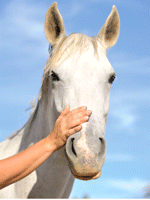Investigators at Greystone Park Psychiatric Hospital, a 500-bed state facility in Morris Plains, N.J., are learning something Will Rogers said long ago: "A man that don't love a horse, there is something the matter with him."
And for a man—or a woman—suffering from mental illness that results in violent outbursts, spending time with a horse might make things a little more right. Jeffry Nurenberg, M.D., the clinical director of the hospital, saw this effect firsthand when one of the hospital's employees, who often brought his horse to nursing homes and children's hospitals, brought him to the psychiatric hospital. "Many of us were impressed with how different our violent patients appeared when with the horse," Nurenberg told Psychiatric News.
Nurenberg searched for published studies of equine therapy with psychiatric inpatients and found that none existed. Working with a team from the Department of Psychiatry at the University of Medicine and Dentistry of New Jersey, he began defining and creating such a program.
"We had to go through a rigorous process requiring approval by the university's institutional review board as a research project rather than a typical performance-improvement process," said Nurenberg. The group settled on the model of the Equine Assisted Growth and Learning Association (EAGALA). With the oversight of a local equine academy specializing in individual encounters with physically and mentally impaired people, the setting and procedures were developed.
Nurenberg explained the process: "We used a group-treatment model with 10 patients at each one-hour session and three sessions per day. There was a 45-minute break between sessions. The horses were free to graze before the sessions started and during the breaks and after the sessions. The 10 patients were divided into three groups and supervised in the day's task by both an equine specialist and our clinicians. In the beginning, the patients were encouraged to approach the horse, then to pet the horse and lead the horse. Patients worked together to learn to saddle the horse (although riding was not allowed, for safety reasons) and to encourage the horse to walk between two cones without intimidation or the use of bribery."
For comparison, similar sessions with dogs were conducted as well. A volunteer from a local animal-rescue organization brought a certified therapy dog. Interactions with the dogs progressed from introduction of the dog, to learning how to soothe the dog, to grooming the dog, and eventually to walking the dog and eliciting simple tricks.
A control group of 30 patients attended a group-therapy session outside of the building and had an hour of psychosocial rehabilitation with a senior experienced therapist, to rule out the possibility that positive results in the equine or canine therapy groups were simply the result of being allowed to leave the hospital building and being provided with special attention.
The researchers used six staff-rated scales and two patient-rated scales to assess the effect of the intervention on the patients.
Not surprisingly to pet lovers, both of the groups who participated in animal-assisted therapy showed evidence of a positive effect. What was surprising was that exposure to the horses resulted in an effect that was two to three times as great as spending time with the dogs. "These clinical observations identified dramatic functional improvement with equine therapy in some highly regressed and violent patients," said the group in their poster presentation, "Equine Assisted Therapy for Patients With Severe Chronic Psychiatric Disorders" at the APA annual meeting in Honolulu in May.
Nurenberg and his colleagues believe these findings suggest unique benefits for equine therapy compared with canine therapy and standard in-hospital treatment, with possible unique benefits for long-term psychiatric patients at risk for violence. The group just received a grant from the Greystone Park Association that will allow them to extend the therapy to other patients in their facility. They intend to publish the results of their work.
More information about EAGALA and equine-assisted psychotherapy is posted at <www.eagala.org>. 
